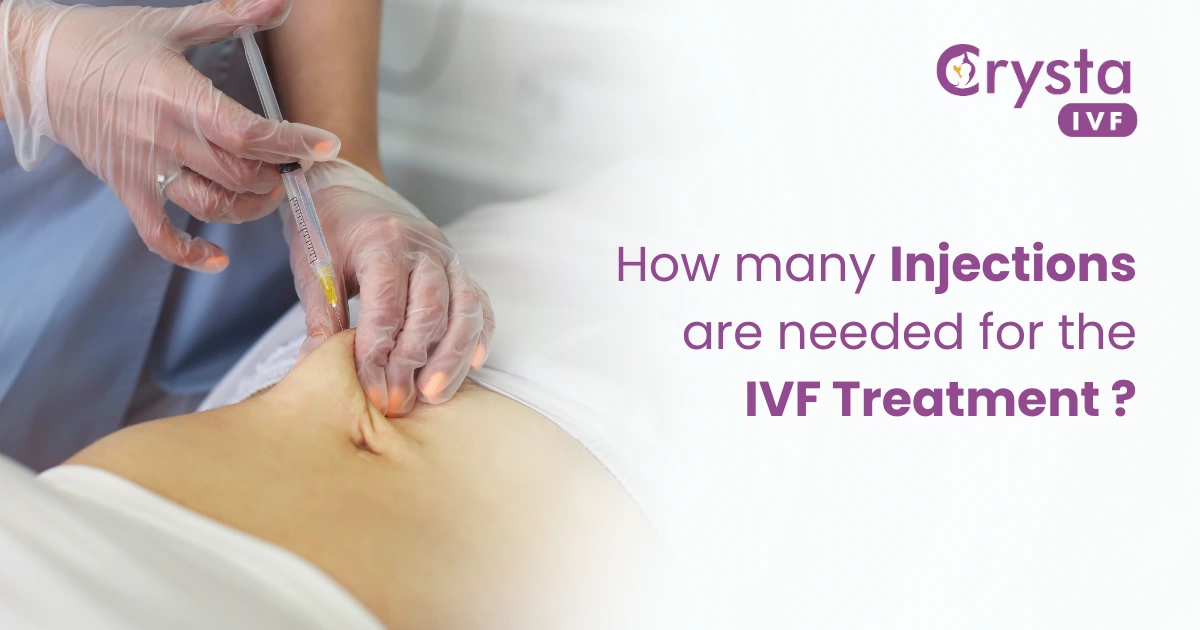If you have been struggling to conceive and trying for more than a year, then you should take a moment and plan to look into fertility treatments and study IVF injections. Research says continuous trials over a year can indicate infertility and require an immediate check on your reproductive health.
Out of fertility treatments, Assisted reproductive technologies (ART) and their form, In-vitro fertilization, emerge on top. IVF treatment came into action in 1978 and quickly became successful. Since then, it has been widely accepted as the best fertility treatment for various couples.
As a complex assisted reproductive technology, IVF involves various steps, including hormone stimulation through injections for IVF treatment. While the thought of injections might seem daunting, understanding the process and the number of required injections for IVF treatment can aid in alleviating your concern.
Hence, in this blog, we will shed light on the significance of IVF injections in your journey toward parenthood. So let’s get started!
Why do you need injections during the IVF cycle?
In your IVF treatment journey, injections are vital in optimizing the chances of conception. Normally, the ovaries produce a single egg per month. Still, with the help of medication injections, your ovaries can be stimulated to produce and deliver a higher number of mature eggs, improving the likelihood of your fertility.
injections in In vitro fertilization allows the fertility expert to select only high-quality eggs so that the chances of successful inception can be increased productively.
With the assistance of injections for IVF treatment, a fertility specialist will modify your ovulation and adjust the dosage to achieve the desired results. These injections are typically administered into the muscle or beneath your skin’s surface. As per your reproductive health, there are two types of medications used in IVF injections: one that stimulates the egg’s production and another that prevents premature ovulation.
These injections are used during egg retrieval and embryo transfer to maximize a woman’s fertility potential. In certain cases, additional progesterone injections may also be recommended after embryo transfer to enhance further and support the implantation process.
The Number of Injections Needed for IVF Treatment?
The number of injections required during IVF treatment varies from woman to woman. Moreover, it can also depend on the IVF protocol and the fertility center you choose for your IVF treatment.
Your doctor will monitor and examine your reproductive health and determine the correct number of injections for IVF treatment. After that, the doctor will adjust the injection dosage as required by monitoring the follicles in the ovaries through ultrasound and other tests. For better results, it is always recommended to stick to the dosage prescribed by your doctor.
Though, in general, you may require 1 to 2 injections every day for 10 days during your ovulation stimulation period.
Determining the Optimal Time for IVF Injections
The timing of injections plays an important role in IVF treatment success. Your fertility specialist will carefully plan the administration of IVF injections to align with your menstrual cycle.
To stimulate the ovaries to produce multiple eggs, the timing of the IVF injection is considered to be of utmost importance. So your doctor will closely monitor your hormone levels and follicular growth, and based on these assessments, the ideal time for injections will be decided to optimize the IVF treatment outcomes.
Are IVF Injections Painful? Understanding the Truth about Discomfort
Generally, IVF injections are given on the thigh, arm, or belly. Contrary to popular belief, IVF injections only cause a slight pinching sensation on the skin. However, the pain can vary from woman to woman according to their health conditions. Research confirms that women who are more sensitive and afraid of injections experience more pain and discomfort. Hence, it is important to share knowledge of injections in In vitro fertilization with your partner while taking timely doctor consultations.
Always remember that by using IVF injections, your doctor gains full control over your ovulation. To improve the chances of successful conception, your doctor monitors follicles with ultrasound and blood tests. Based on the result, you will receive the dosage.
Injections for IVF treatment may lead to:
- Stress
- Anxiety
- Upset stomach
- Nausea and bloating
- Constipation and diarrhea
- Mood swings
- Appetite changes
- Tenderness in the breast
- Irritability and restlessness
- Skin redness, soreness, or bruise at the injected site
- Headaches, night sweats, and hot flashes
Acknowledging the discomfort caused by injections, you do not have to get stressed; just be informed and discuss every detail of your health with your doctor. Also, do not forget to numb the injection site with the help of ice or a cold pack.
Be informed and make your decision!
Though the number of injections required for IVF treatment may seem daunting initially, it is essential to remember that each injection serves a vital purpose in your journey toward parenthood. However, It is also necessary to connect with the best IVF center in Delhi to get the support of a caring medical team. As you embark on this transformative journey, remember that IVF injection are a temporary and necessary step to increase your chances of successful conception. Remember, you are not alone.
Countless couples have also overcome infertility challenges through IVF, along with you. So, let the promise of a brighter future and the dream of a growing family be your motivation. Step forward on this extraordinary path toward parenthood to live your life to the fullest.




